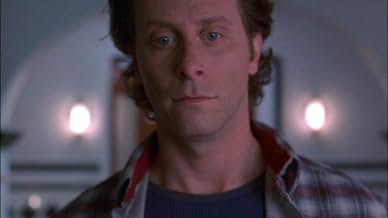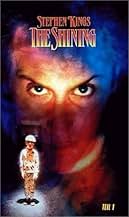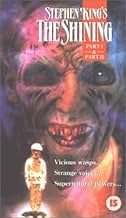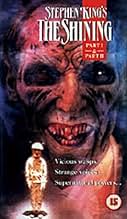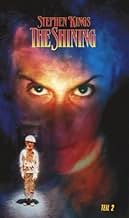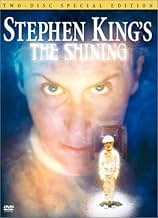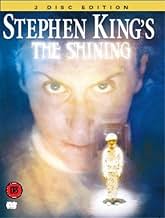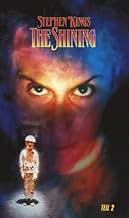Un alcolizzato in via di guarigione deve lottare con i demoni interni ed esteriori quando lui e la sua famiglia si trasferiscono come custode in un hotel infestato.Un alcolizzato in via di guarigione deve lottare con i demoni interni ed esteriori quando lui e la sua famiglia si trasferiscono come custode in un hotel infestato.Un alcolizzato in via di guarigione deve lottare con i demoni interni ed esteriori quando lui e la sua famiglia si trasferiscono come custode in un hotel infestato.
- Vincitore di 2 Primetime Emmy
- 15 vittorie e 10 candidature totali
Sfoglia gli episodi
Recensioni in evidenza
A single statement: No film will be done justice if produced for a network. The censorship laws will simply not allow it. This is why I'm so perplexed as to why Stephen King has done two of his most prolific novels ("The Stand" and "The Shining") through network miniseries format. There's also one other reality our dear Mr. King is going to have to realize: While cornering the market on the written word, King's ideas fall as flat as two-day old soda on the big screen. The horrific adaptation of "Pet Sematary" and the cornball delivery of "The Stand" are just testaments that SK's books should remain locked in the binding. "The Green Mile" is the ONLY true-to-book adaptation of a King novel, and that's just because the director and studio deemed it necessary. I have heard an exorbitant amount of comparison between the miniseries "The Shining" and the Kubrick film, or the lack thereof, to be more precise. King has often said that he didn't like the 1980 film, and it should be used as an example of how not to make a horror film. King should realize that Stanley Kubrick's "The Shining", while deviating from aspects of the author's story and changing the end, is still better than his own vision of the adaptation. As a King fan, one becomes aware of a certain mystique that makes his books addictive. However, seeing his films make one realize that King has quite a different opinion on the delivery of his work, as opposed to the darker opinions of his readers. In 1980, Stanley Kubrick presented the world with the first epic horror film. The fact that he changed the story and ending are dismissable, simply because Kubrick removed the useless flab from a mass of back story and (forgive me) somewhat cheesy happenings in the Overlook. The Kubrick film is better for two reasons: 1) It's a dark, moody descent into madness. The cinematography in Kubrick's film is revolutionary. King's own brainchild is lumbering and standard fare. 2) The ending of Kubrick's film is simply better. It's incredibly distrubing, whereas King's thoughts on the end of Jack Torrance's odyssey are somewhat... more redeeming. One gets the idea from Kubrick that the Overlook's evil is insurmountable and, indeed, necessary. King's conclusion is the common end of good overcoming evil, etc. End result -- When it's Kubrick vs. King, good ol' Stanley (R.I.P.) comes out on top. Regardless of whether King originated the story, Kubrick delivered it to glory, and made it an instant classic. King merely proved he could make a version of the film himself, and make the effort seem completely unnecessary in the process.
I liked the fact that the film was more faithful to the book - one of my all-time favorite books, incidentally.
However, that's about the only thing that was better. This version was long, boring and the acting was absolutely horrid. I've never seen a movie where EVERYONE overacted. Elliot Gould as Stuart Ullman was terrifying- Gould tried way too hard, and his performance was wooden.
In fact, it seemed as if all the actors were reading from cue cards the entire time. If someone without any cinematic skills like me can notice this, couldn't the people involved with the film have noticed too? There's no way they wanted people to act like this.
OH well. I didn't think anything could make me think the original Shining was a great movie once I read the book, but I have to say, I'll take the "unfaithful" version anytime.
However, that's about the only thing that was better. This version was long, boring and the acting was absolutely horrid. I've never seen a movie where EVERYONE overacted. Elliot Gould as Stuart Ullman was terrifying- Gould tried way too hard, and his performance was wooden.
In fact, it seemed as if all the actors were reading from cue cards the entire time. If someone without any cinematic skills like me can notice this, couldn't the people involved with the film have noticed too? There's no way they wanted people to act like this.
OH well. I didn't think anything could make me think the original Shining was a great movie once I read the book, but I have to say, I'll take the "unfaithful" version anytime.
This television series was so dreadful, so dull and cheesy, how could any intelligent person possibly endorse it? Sure it was a much more faithful adaptation of King, but, for Christ's sake, it was shot like an after-school special, suffered the WORST miscasting, had some of the most godawful CGI effects (the moving shrubs made our entire roomful of viewers crack up), and lacked any mild attempts at atmosphere or terror. How could anyone EVER be scared by Steven Weber? It's like watching Barney descend into madness. What Kubrick lacked in direct interpretation he so greatly compensated for with a beautiful, disturbing and personal film. Remember people...BASED on the book by Stephen King. There was a reason many things never made it into the original film...they would look absolutely stupid (ie the shrubs) in direct translation and would most certainly detract from the film. Earlier quote - "Kubrick was a bit of a bad director(have i made any one cry just then)" No, you just made me laugh at you!
Not great in the production department because it was made for tv and the acting is ok. But it follows the book way more than the popular Kubrick version and I appreciate that. King had a huge part in making this version and it shows. It was a little slow at times but overall I enjoyed it.
While Kubrick's "The Shining" is just based on the famous King's novel, the 1997 adaptation is much more faithful to the source material, as King himself adapted the story for television. Kubrick's version is an objectively better film, but essentially these two movies are not quite comparable, because their approach to the story, techniques and intentions are pretty much different. While Kubrick's film is more a psychological horror drama, mini-series directed by Mick Garris is a typical supernatural horror with an atmosphere distinctive of these two legends of the genre.
Although no one can feign madness as Jack Nicholson (if he fakes it at all), and the fear of Shelley Duvall creeps chills to the bone, the cast is okay for such a TV movie, and it is composed of recognizable and dear faces who gave quite decent performances. Rebecca De Mornay is a sight for sore eyes, Steven Weber is not nearly as intimidating as Nicholson, but his madness is convincing enough, and although it took me some time to get used to the unusual appearance of little Courtland Mead, his performance in some scenes is really striking.
The mini-series consists of three parts for a total of four and a half hours. The first part is a bit slow, which is typical for King, who likes to introduce us to the characters and their backgrounds, and to wait for us to develop a closeness to them, before he leisurely leads us into the main story. In the second part, tension gradually increases and what seemed to be a family drama slowly transforms into supernatural horror, with jump-scares and... visual effects. And I think that is exactly where the biggest drawback of this film lies. What had the potential to be a great psychological horror drama, by decently done (except for the scenes with topiaries, which are an unforgivable failure) but totally unnecessary effects, has been transformed into something similar to the B horrors of the eighties, and for that genre, which is more often ridiculous than terrifying, over four hours is definitely too much, the tension is lost and the whole thing becomes quite unconvincing and even boring. The third part is probably the best done, both visually and story-wise, but it is spoiled by inappropriate and somewhat pathetic ending, that is better suited to melodrama than horror. Not to be perceived as a nag, I just want to praise really extraordinary sound and music.
Although I preferred this version of the story itself over Kubrick's, the movie is terribly over-stretched and the atmosphere is, although I admit that it kept me on the edge of the chair on several occasions, too frivolous to leave an impression that could compete with the Kubrick's masterpiece.
7/10
Although no one can feign madness as Jack Nicholson (if he fakes it at all), and the fear of Shelley Duvall creeps chills to the bone, the cast is okay for such a TV movie, and it is composed of recognizable and dear faces who gave quite decent performances. Rebecca De Mornay is a sight for sore eyes, Steven Weber is not nearly as intimidating as Nicholson, but his madness is convincing enough, and although it took me some time to get used to the unusual appearance of little Courtland Mead, his performance in some scenes is really striking.
The mini-series consists of three parts for a total of four and a half hours. The first part is a bit slow, which is typical for King, who likes to introduce us to the characters and their backgrounds, and to wait for us to develop a closeness to them, before he leisurely leads us into the main story. In the second part, tension gradually increases and what seemed to be a family drama slowly transforms into supernatural horror, with jump-scares and... visual effects. And I think that is exactly where the biggest drawback of this film lies. What had the potential to be a great psychological horror drama, by decently done (except for the scenes with topiaries, which are an unforgivable failure) but totally unnecessary effects, has been transformed into something similar to the B horrors of the eighties, and for that genre, which is more often ridiculous than terrifying, over four hours is definitely too much, the tension is lost and the whole thing becomes quite unconvincing and even boring. The third part is probably the best done, both visually and story-wise, but it is spoiled by inappropriate and somewhat pathetic ending, that is better suited to melodrama than horror. Not to be perceived as a nag, I just want to praise really extraordinary sound and music.
Although I preferred this version of the story itself over Kubrick's, the movie is terribly over-stretched and the atmosphere is, although I admit that it kept me on the edge of the chair on several occasions, too frivolous to leave an impression that could compete with the Kubrick's masterpiece.
7/10
Lo sapevi?
- QuizStephen King: Author plays Gage Creed, the band conductor. Gage Creed is also the name of the 2-year-old boy played by Miko Hughes in Cimitero vivente (1989), also based on a book written by King. King also had a cameo in Pet Sematary.
- BlooperReflected in the Overlook's main doors, behind Watson.
- Citazioni
[Addressing the Overlook Hotel]
Dick Hallorann: Hello, you old bitch. You're just as ugly in wintertime as you are in summertime.
- Versioni alternativeDVD contains 11 deleted scenes:
- Danny at the doctor's office; they briefly discuss Tony.
- Brief scene with Danny and Jack conversing.
- A brief scene where the Torrences step outside the hotel and observe that they are snowed in.
- A scene which originally occurred after the "217 lady" scene. Jack says that Wendy and Danny can leave the hotel ASAP and that he will stay. He also shows Wendy the lipstick he found, and describes how he believes Danny's strangle wounds were self-inflicted.
- A fireside chat between Wendy and Danny, in which he tells her that he hears the ghosts in the hotel, talking, laughing, and screaming.
- Two scenes which originally occurred after Jack is locked inside the vault. Wendy leaves Danny to get some food, and Danny tells her that he called to Dick. Then a scene in which Wendy returns and Danny says that Dick may not have heard him.
- A brief scene showing Grady releasing Jack from the vault, and Jack exiting and grabbing the mallet.
- A brief scene in which Danny encounters a female ghost, and he tells her he isn't afraid of her, that only his father can hurt him now. The ghost vanishes, and Jack then appears to "punish" him.
- A climatic ballroom scene in which the "party guests" and the orchestra all melt in gruesome fashion.
- An outtake featuring orchestra conductor Gage Creed (played by Stephen King) melting in gruesome fashion.
- ConnessioniFeatured in The 49th Annual Primetime Emmy Awards (1997)
I più visti
Accedi per valutare e creare un elenco di titoli salvati per ottenere consigli personalizzati
Dettagli
- Data di uscita
- Paese di origine
- Lingua
- Celebre anche come
- The Shining
- Luoghi delle riprese
- Aziende produttrici
- Vedi altri crediti dell’azienda su IMDbPro
- Tempo di esecuzione
- 1h 31min(91 min)
- Colore
- Mix di suoni
- Proporzioni
- 1.33 : 1
Contribuisci a questa pagina
Suggerisci una modifica o aggiungi i contenuti mancanti


